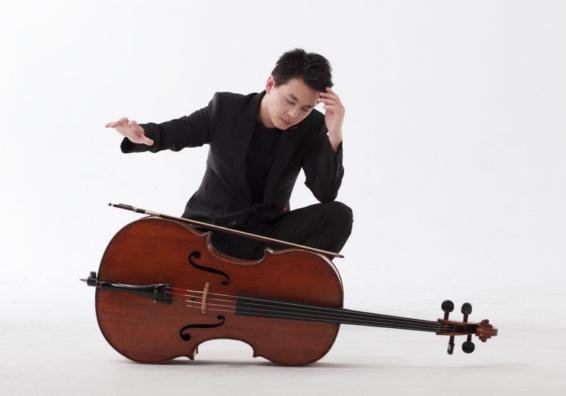MCO’s Rococo Cello can be heard in Melbourne on Thursday 02 March at The Deakin Edge, Federation Square & Sunday 05 March at Melbourne Recital Centre.
March 2017 3MBS
By ROBIN USHER
International success has not diminished the ties to Melbourne for prize-winning cellist Li-Wei Qin. ‘’It’s special to come back home where my parents live and where I have so many colleagues from the time I studied at the Melbourne Conservatorium,’’ he says.
‘’I realised a few years ago that I was not coming to Australia very often so I told my people that I would like to come home more.’’ He is making his first appearance with the Melbourne Chamber Orchestra in March performing Tchaikovsky’s Variations on a Rococo Theme and C.P.E.Bach’s A major concerto.
This is one of five Australian bookings this year that began in January as artist in residence at the Australian Youth Orchestra’s music camp in Adelaide and performances of Elgar’s Cello Concerto to celebrate AYO’s 60th Birthday, in Canberra and Sydney.
‘’I attended the national camp in 1991 and toured with the orchestra as a soloist in the late ‘90s. Those links are special to me.’’
He returns to Melbourne in August to perform Dvorak’s cello concerto with the MSO, continuing links that began in 1993 when he recorded the work with the orchestra as well as Tchaikovsky’s Variations.
Born in Shanghai, Li-Wei moved to Melbourne with his family in 1989 when he was 13. His talent was recognised internationally when he won the silver medal at the 1998 Tchaikovsky Competition and first prize in New York’s 2001 Naumburg Competition, before he went on to win the Young Australian of the Year award in 2002.
Now 40, he brings fresh insights to Tchaikovsky’s Variations which he has been playing since he was15. These were gained last year when he performed with the Malaysian Symphony under renowned Russian pianist and conductor Vladimir Ashkenazy.
‘’He is a hero of mine and is steeped in the Russian tradition,’’ Li-Wei says, ‘’He opened a different window on the work when he said the main requirement needed to play it was not virtuosity but generosity. That was not the first thing that used to strike me but now I totally agree.’’
He says the chief requirement playing work is the need to find a balance between the rococo style which originates in the late 18th century and the nature of Tchaikovsky who comes from a later contrasting period.
‘’If playing works by Haydn and C.P.E. Bach is like trying to dance on ice, then with the Tchaikovsky it’s like you are on the ice naked,’’ he laughs.
Li-Wei is speaking from Singapore where he teaches at the Yong Siew Toh Conservatory which opened in 2006. ‘’Education is important to me and I find it exciting to pass on my experiences to students,’’ he says.
He describes the facilities at the conservatory, where he has taught for a decade, as ‘’amazing’’. They include a new 600-seat concert hall and full financial support to 220 students studying bachelor of music degrees.
He says there has been a major shift in the music scene to Asia, especially China recently. ‘’Some people consider mentioning money to be a dirty word but the arts need resources and China is making it happen.’’
There are 75 orchestras in China, 36 with full seasons. He says the newest opened last year with a premiere performance featuring renowned German violinist Anne-Sophie Mutter, who is much in demand.
Li-Wei finds Singapore to be an ideal hub for his career, which includes returning to London where he studied at the Guildhall every year, and regular European bookings. ‘’It makes getting to Australia manageable and is close to China,’’ he says. ’’There are social and environmental issues that make it hard to actually live there.’’
He performed in Shanghai last April as soloist during the MSO’s China tour, as well as later taking part in the European tour by the China Philharmonic. His recent recordings with the London Philharmonic and Singapore and Shanghai symphonies reflect his wide-ranging popularity.
Li-Wei hopes to explore ways to enlarge the cello repertoire by collaborating with younger composers. ‘’I’m doing what I always wanted to do but there are not a lot of options for cellists, apart from eight or nine stand-out works. That’s it.’’
He points to the first Shostakovich cello concerto which is now widely played. The composer wrote it in 1959 for his friend, cellist Mstislav Rostropovich. ‘’That is a big contribution to the instrument and music generally and it would not have happened without Rostropovich,’’ he says.
He would like to encourage composers to write for the cello. ‘’After all we as musicians are just a platform for what they write,’’ he says.
Li-Wei Qin performs C.P.E.Bach’s A major cello concerto and Tchaikovsky’s Variations on a Rococo Theme with the Melbourne Chamber Orchestra under Michael Dahlenburg at Federation Square’s Deakin Edge on March 2 and at the Melbourne Recital Centre on March 5. The rest of the program includes Mozart’s Idomeneo overture and Haydn’s symphony No 88.
With thanks to 3MBS and Robin Usher for the use of this interview.

